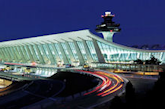 by James A. Bacon
by James A. Bacon
Overlooked in the contentious debate over Virginia’s representation on the Metropolitan Washington Airports Authority board is this salient fact: MWAA won’t seat the two new directors appointed by Governor Bob McDonnell until the District of Columbia joins Virginia in amending the interstate compact creating MWAA. While Virginia passed the necessary legislation, which goes into effect July 1, D.C. has not.
Indeed, there is no assurance that the District will play ball. According to my sources, Mayor Vincent C. Gray’s office agrees with MWAA that no new representatives can be added to the authority’s board until D.C. also amends the compact. And right now, the mayor’s office is reviewing its options. Nothing has been decided. No measures have been introduced to City Council.
Governor Bob McDonnell and the MWAA board have been battling over a number of issues relating to the cost and financing of the Rail-to-Dulles heavy rail project. Last year Congress passed a law, which was signed by President Obama, that would expand the MWAA board from 13 members to 17, adding one representative from Maryland, one from the District and two from Virginia. McDonnell promptly appointed two members but MWAA refused to seat them.
The United States Constitution gives power to Congress to review and approve compacts between two more states, explains Philip Sunderland, MWAA legal counsel. That makes sense, he says, because “you don’t want the states getting together and giving themselves power to perform federal activities.” But the Constitution is silent on Congress’ authority to amend an interstate compact. The issue has never been addressed by a court, so there is a legitimate question.
MWAA hired an outside law firm, Jenner & Block, to dig into the issue. In a 24-page review, the firm concluded that Congress does not have unilateral authority to impose its will on the states.
“We shared that opinion with a lot of people,” says Sunderland, including officials with the U.S. Department of Transportation, the Department of Justice and even the Virginia Attorney General’s office. “We are told that there are no lawyers with DOT or Justice who disagreed with the conclusions. … We never got anything back from Virginia.”
In a letter to the USDOT inspector general, which released a report critical of the MWAA board’s ethics and transparency, Rep. Frank Wolf, R-10, declared that MWAA had retained the law firm specifically for the purpose of “advising the board on how it could avoid complying with a bipartisan law passed by Congress and signed by President Obama.”
Sunderlin rejects that characterization, insisting that MWAA hired the firm “to get direction on how to comply with the law.”
“We’re out to obey the law, not create the law,” he said. “We were not looking for a preordained conclusion.”
In theory, it would be marginally to D.C.’s advantage to increase the size of the board. By adding one seat to its existing three, it would juice the percentage of representation from 23.1% to 23.5%. However, that incremental gain may be offset by D.C.’s stance on MWAA’s decision to give preferences to Project Labor Agreements in the bidding process for Phase 2 of the Rail-to-Dulles project, or other issues.
I have put in calls to Wolf’s office and the Attorney General’s office and will update this post if they respond. If they do not contest Sunderland’s analysis of the legal issues, I may have to update my characterization of MWAA as a rogue agency. Wrong, perhaps. But not rogue.


